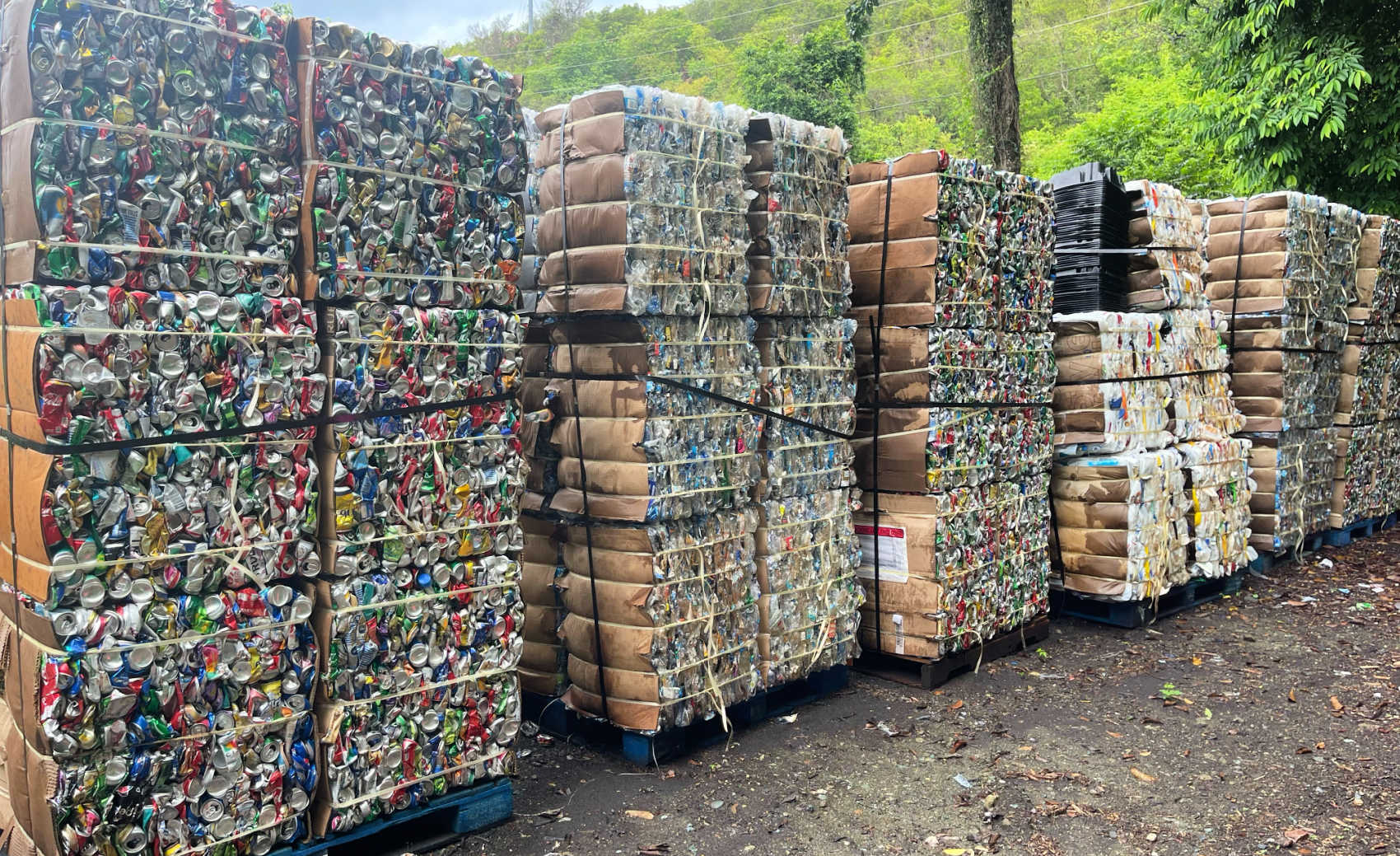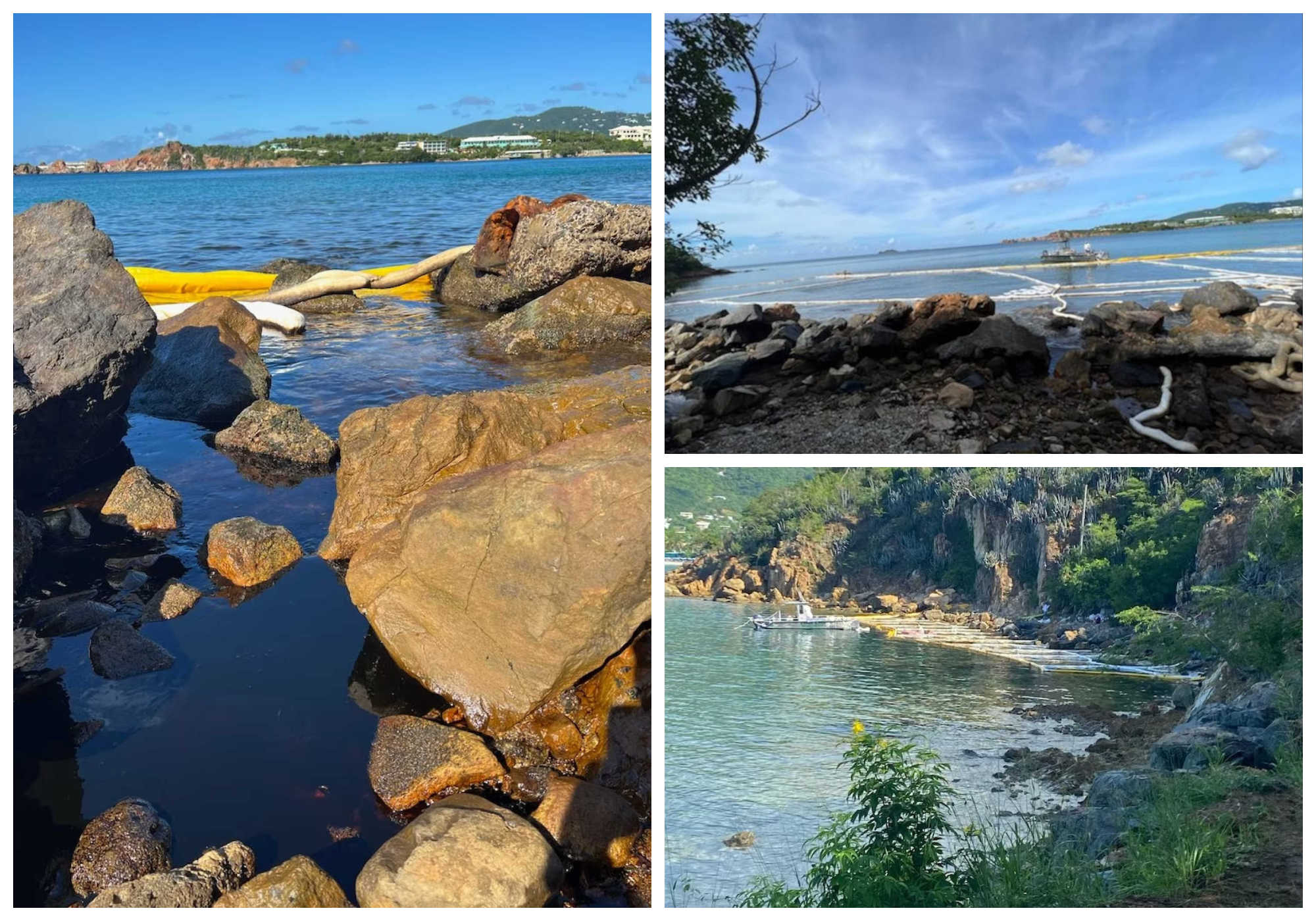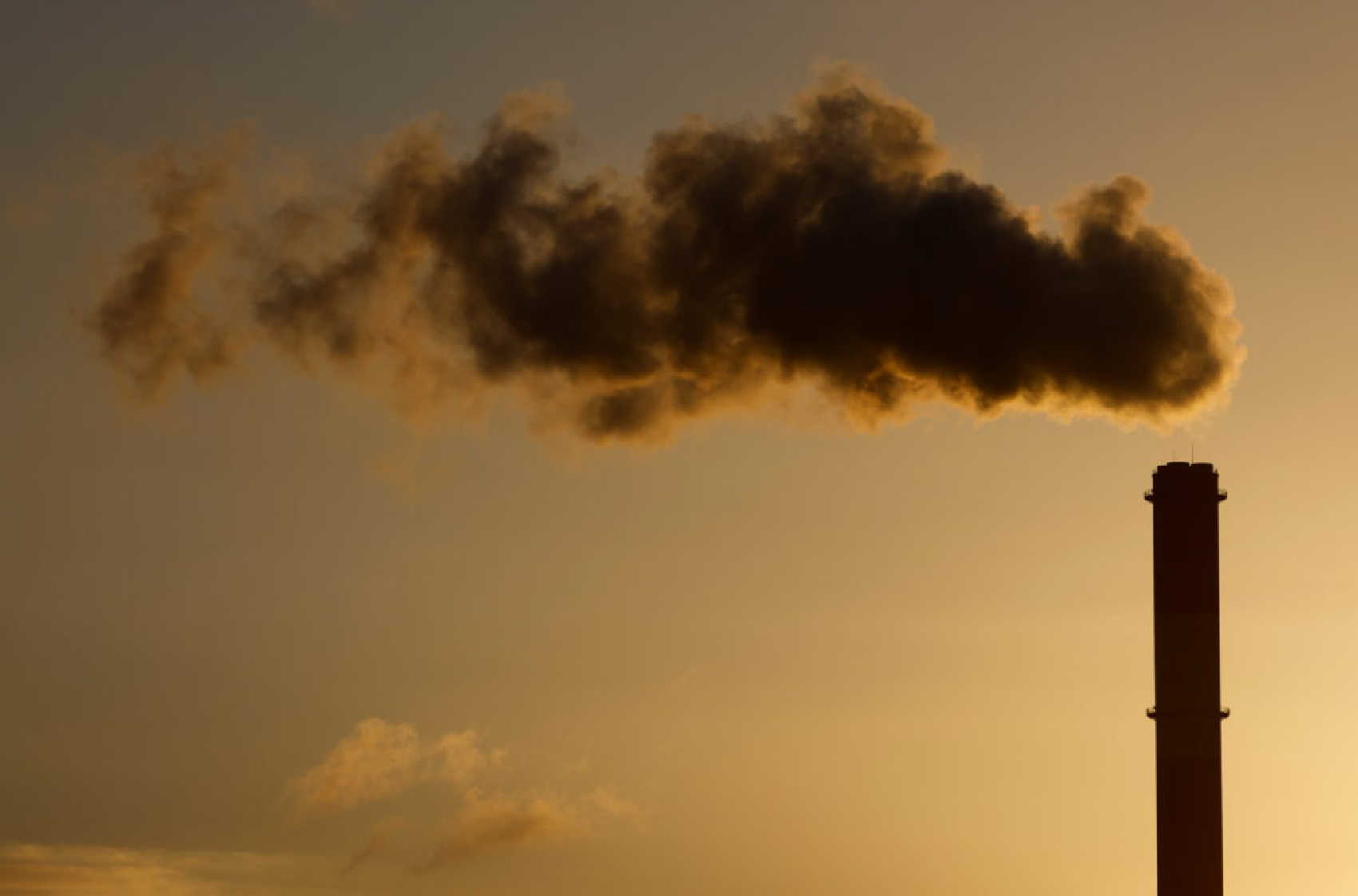Environment
Island Green Living Makes Notable Environmental Impact with Recycling Initiatives in 2023

In a remarkable environmental stride this year, Island Green Living, a respected nonprofit organization in St. John, has reported recycling figures touching almost one million aluminum cans and 45,000 pounds of plastics. These recycled items were earlier destined for marine habitats, which have long borne the brunt of pollution.
This initiative, funded largely by benevolent donations, marks a grand tally of nearly 3 million aluminum cans and an astounding 30 tons of plastic debris saved from cluttering the beautiful land, water, and urban areas of the island since the inception of these eco-friendly drives.
In a recent update, the seventh consignment of recyclable materials was dispatched to their steadfast partner, PADNOS. This pivotal shipment was aided by Tropical Shipping, who facilitated it for the third time. Their generous contribution came in the form of a returning cargo vessel headed for mainland America, which they offered at a notably reduced fare. This consignment proudly carried 233,046 aluminum cans and 11,240 pounds of plastics.
In appreciation of the gesture, Jennifer Nugent-Hill, the authoritative voice for governmental and community affairs at Tropical Shipping, remarked, “It’s an honor for Tropical Shipping to partner with Island Green, amplifying their mission to conserve the picturesque Virgin Islands.”
Similarly, Harith Wickrema, Island Green Living’s president, articulated his profound appreciation for the enduring partnership. “The considerable concession Tropical Shipping offers us for transportation dramatically expands our recycling outreach, given the pressing issue of our saturated landfills,” emphasized Wickrema. He further acknowledged the indispensable roles played by Governor Albert Bryan, Congresswoman Stacey Plaskett, the local legislative body, and the community at large. “This monumental success owes its existence to the synergistic efforts of our partners,” he expressed.
However, on the flip side, Wickrema pointed out that despite these substantial figures, they barely scratch the surface of the potential recyclables generated within the region. “Almost 60% of our generated waste is compost-ready, and nearly a fifth is recyclable. This waste isn’t mere trash; it’s a precious commodity,” he underscored, shedding light on the persistent challenges nonprofit sectors face in waste management.
Island Green Living’s executive director, Kelly McKinney, further spotlighted the charitable nature of St. John’s recycling measures. “It’s pivotal for our community to recognize that these programs largely rest on philanthropy, unlike other municipal undertakings,” McKinney voiced. With the onset of another proactive season, the organization is keen to augment community engagement and resources.
Strategically positioned recycling repositories dot the landscape of St. John at crucial junctures like Cruz Bay, Gifft Hill Road, and Coral Bay. Drop-offs are also welcomed at their ReSource Depot and a special bin located at Caneel Bay Fuel Dock. The organization underlines the importance of pre-sorting plastics, emphasizing the exclusion of items like plastic cutlery, bags, and Styrofoam.
With an illustrious 19-year trajectory, Island Green Living is a vanguard in conservation and sustainable living in St. John. Just to cite one instance, their ReSource Depot thrift store has singularly averted around 900,000 pounds of construction and miscellaneous materials from ending up in landfills. Moreover, they have been instrumental in legislative endeavors, leading the charge against plastic bags, straws, and ecologically harmful sunscreens.
For those intrigued by their mission and wishing to contribute, further details and opportunities can be found on their official website: www.islandgreenliving.org. As a certified 501(c)(3) nonprofit, Island Green Living Association remains unwavering in its commitment to fostering an eco-friendly ethos in the U.S. Virgin Islands.
Environment
Over 50,000 Gallons of Diesel Spilled at Randolph Harley Power Plant, Cleanup Efforts Escalate

Authorities continue their extensive efforts to manage a significant diesel fuel spill at the Randolph Harley Power Plant, initially reported last October. The cleanup operation is spearheaded by the National Oceanic and Atmospheric Administration’s Office of Response and Restoration (OR&R), in collaboration with the United States Coast Guard.
A recent statement from OR&R revealed that the initial spill estimate of 33,600 gallons has been revised upward, indicating that over 50,000 gallons were lost from tank #11 owned by the Water and Power Authority at the site.
Since the incident, OR&R’s Scientific Support Coordinator has assessed the spill’s potential impact on nearby water bodies, pinpointing resources at risk in Lindbergh Bay and Krum Bay.
U.S. Coast Guard Federal On-Scene Coordinator Jose Díaz has endorsed NOAA’s continued involvement in the cleanup. “This complex, multi-phased response requires long-term commitment to meet all regulatory and environmental standards,” explained Captain Díaz. The initial assessment phase is projected to continue for approximately three months, with further actions to follow.
The cleanup team is coordinating with various local agencies and organizations, including the V.I. Department of Planning and Natural Resources and the Environmental Protection Agency, to orchestrate a comprehensive response.
Currently, efforts are concentrated on extracting subsurface diesel from hillsides leading to Lindbergh Bay and Krum Bay, and from the coastal areas of Lindbergh Bay. Techniques such as the use of irrigation systems to channel the diesel to collection points are in action. Additionally, consultants are employing LiDAR technology to assist with sub-surface site assessments and plume modeling, optimizing the recovery process.
Authorities are also reassessing the potential impact on local ecosystems and endangered species in the area, ensuring that environmental safeguards are in place. Although there have been no reports of affected wildlife, continuous monitoring is crucial.
Drawing on insights from similar cleanup operations in Florida, the teams are developing and implementing strategies to effectively manage the current situation. The priority remains to restore the affected zones and minimize environmental damage as the cleanup progresses.
Environment
Anticipating the Heat: A Forecast of Rising Temperatures in the Caribbean

The Caribbean Climate Outlook Forum (CariCOF) has recently issued a warning that the Caribbean region is set to face near-record temperatures over the next six months. According to CariCOF, temperatures are already above normal and are expected to climb further as we approach the peak of the Caribbean heat season in August and September. This surge in heat is predicted to affect virtually every aspect of daily life, with several impacts already being felt.
Public health experts are bracing for a significant uptick in heat-related symptoms, including a sharp rise in cases of heat illnesses, fainting, and hospitalizations. CariCOF has also highlighted an expected increase in biological hazards, such as gastrointestinal and mosquito-borne diseases, with dengue fever cases already on the rise in certain areas. Moreover, the extreme temperatures may lead to increased snacking or binge eating, contributing to various health issues. The agency also anticipates a surge in fatigue, irritability, and aggression as a result of prolonged exposure to high temperatures.
Economic sectors dependent on outdoor labor are poised for a challenging period. Livestock will require more cooling and ventilation to avoid heat stress, which could lead to stunted growth in chickens and a decrease in egg and dairy production. Crop productivity is expected to plummet, especially during peak heat hours from 10:00 a.m. to 3:00 p.m., due to increased wilting.
The repercussions of above-average temperatures will also extend to marine life. Warmer ocean temperatures could lead to more frequent and severe hurricanes, alongside a decrease in fish harvests. Tourism, a key economic driver for the region, may suffer as excessive heat compromises the comfort and safety of visitors, leading to higher operational costs for accommodation providers and potential damage to coral reefs from bleaching.
Utility companies are likely to face heightened demand for electricity as both residents and businesses seek relief from the heat, possibly outstripping the efficiency of energy production and resulting in power outages. The heat is also expected to exacerbate water scarcity by increasing evaporation rates, further straining water supply systems.
Children and other vulnerable groups are among those who will be most affected. CariCOF notes that the heat may severely impact students’ ability to learn, recalling the protests last year by students in St. Croix against inadequate heat mitigation in schools. This led to adjustments in school schedules to minimize exposure to extreme temperatures—a measure that may need to be revisited this year.
As the Caribbean prepares to navigate another hot season, CariCOF’s forecast underscores the need for comprehensive strategies to mitigate the impacts of rising temperatures, echoing the adaptive measures taken in the past year.
Environment
USVI and Neighboring Regions Achieve Significant Reduction in Toxic Chemical Releases, Highlights EPA 2022 Report

The U.S. Environmental Protection Agency (EPA) made public its 2022 Toxics Release Inventory (TRI) National Analysis this Thursday, showcasing a commendable 21% decrease in the environmental release of TRI-listed chemicals by regulated facilities since 2013. This reduction includes a striking 26% decline in air emissions, indicating significant progress in environmental protection efforts.
The analysis also brought to light a 14% economic growth in the U.S. manufacturing sector, occurring alongside the reduction in pollution. This correlation underscores the possibility of simultaneous industrial growth and environmental stewardship.
A noteworthy achievement was recorded in Region 2, which includes New Jersey, New York, Puerto Rico, the U.S. Virgin Islands, and eight Indigenous Nations. This region witnessed a 24% cut in production-related waste management from TRI facilities since 2013. In 2022, these areas demonstrated exemplary waste management, directing 94% of their waste toward preferable treatment methods, including recycling, energy recovery, and treatment, thereby limiting harmful environmental releases to a mere 6%. The total releases and disposals in Region 2 were reported at 34.1 million pounds.
Adding to this positive trend, 11% of facilities in Region 2 implemented new pollution prevention measures in 2022, a figure that exceeds the national average of 8%. These improvements frequently involved operational adjustments and the enhancement of training programs.
Lisa F. Garcia, Regional Administrator, emphasized the importance of the TRI data for community awareness regarding local toxic chemical usage. Garcia highlighted, “The Toxics Release Inventory data is pivotal in upholding the community’s right to be informed about the toxic chemicals handled in facilities within their vicinities.” She reaffirmed the EPA’s dedication to enhancing this vital resource for the empowerment of the public.
The nationwide findings of the TRI National Analysis for 2022 indicated that a substantial 88.5% of TRI chemical waste was managed through recycling, energy recovery, and treatment, with only 11.5% being released into the environment. The analysis compiled data from over 21,000 facilities across diverse sectors, such as manufacturing, mining, and electric utilities.
The 2022 report introduces improved visual and analytical tools, including the “Where You Live” mapping feature, to enable easier community access to crucial information. This tool allows users to delve into data by state, Tribe, metropolitan area, EPA region, and watershed, integrating demographic details to highlight chemical exposure risks, especially in communities bearing heavier burdens.
The report also identifies trends in waste management across specific sectors and chemicals and features profiles for the primary metals manufacturing sector, electric utilities, chemical manufacturing, and metal mining.
To disseminate these findings further, the EPA has scheduled a public webinar for Thursday, April 4, 2024, at 2 p.m. ET. This event will offer an in-depth review of the 2022 TRI National Analysis and discuss its significance for environmental safety and community health. The webinar is open for registration to all interested individuals, promising to be an enlightening session on the strides made in reducing toxic chemical releases.
-

 Education1 year ago
Education1 year agoEducation Board Seeks Input on Schools Through Comprehensive Survey
-

 Education2 years ago
Education2 years agoCTE Board Enthusiastic About New Curriculum Standards, Yet Anxious Over Apprenticeship Support
-

 Crime2 years ago
Crime2 years agoRegistered Sex Offender Detained for Illegal Firearm Possession During Annual Surveillance Drive
-

 Development1 year ago
Development1 year agoCosts Surge as Donoe Estates Housing Project Resumes with New Contractor
-

 Videos3 years ago
Videos3 years ago2022 Gubernatorial Election: Voters Speak Out
-

 Videos3 years ago
Videos3 years agoGubernatorial Teams Celebrate St. Croix’s Bull & Bread Day
-

 Videos3 years ago
Videos3 years agoWakanda’s Female Might: A Dive into ‘Black Panther: Wakanda Forever’
-

 Crime2 years ago
Crime2 years agoSt. John’s Westin Resort Scene of Armed Robbery, Prompting Heightened Police Vigilance




